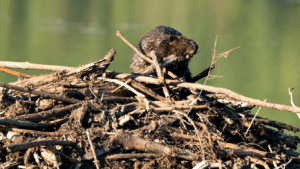A brutal combination of war, poverty, and corruption is shattering wildlife populations across Burkina Faso. Natural reserves, home to some of the most iconic animals on earth, have become a battle zone ravaged by militants, armed rebels, drug cartels, and poachers. The situation is dire.
Civil unrest has made it difficult for environmentalists to protect fragile animals on the ground. Endangered West African lions and African bush elephants are being caught in the crosshairs. As it stands, less than 400 lions are thought to remain in the region’s wildlife reserves, making them likely the most endangered lions on the planet. Other wildlife including the aardvark, civet, clawless otter, wild dog, dwarf buffalo, bushbuck, caracal, cheetah, and chimpanzee are also under fire.
Burkina Faso was once a tourist paradise booming with biodiversity. Tragically, this landlocked country in West Africa has seen war deplete its precious natural resources and drastically impact its wildlife. Terrorists have turned conservation reserves into battlefields, executing game rangers and exposing endangered animals to poachers.
Just like much of the rest of the world, the coronavirus pandemic has made the situation in this impoverished country with a weakened health system even more desperate. The virus, combined with human conflict, has exacerbated local poverty causing communities to turn to poaching and the ruthless bushmeat trade to survive.
Last year, clashes between government forces, brigands, and armed groups in Burkina Faso led to the deaths of more than 2,000 people and forced over 700,000 community members to flee their homes. This year, wildlife reserves are gripped by escalating human violence that has spread across the country.
Park rangers fear for their own lives and many have been shot and killed trying to safeguard animals against heavily armed poachers. Ranger stations across reserves have been set alight. Vast areas of fertile grasslands have been torched. The chaos has made it easier for poachers to gain access to wildlife. Lions are chiefly targeted for their skins which sell for up to $2,100. This is according to Panthera, a conservation group that is tracking lions in the region.
Bushmeat poaching has also increased substantially because fewer park rangers are on staff. The infiltration of rebel groups has also led to increased rates of deforestation and forest fragmentation.
It’s understood that while the militants aren’t actively hunting animals themselves, they are bribing poachers. It’s alleged by rangers that the militants pay the poachers a tax to conduct their illicit business in the parks, giving them a safe range to move freely.
Burkina Faso is home to the most exquisite wildlife inhabiting the country’s four national parks and 12 Wildlife Conservation Units, with over 650 mammals (the world’s largest population of roan antelope) and 1,407 different plant species. The Volta River basin teems with almost 200 species of aquatic wildlife including Nile crocodile and hippopotamus. The W National Park, which includes areas of Niger, Benin, and Burkina Faso, is one of the last remaining sites in which you will find the Saharan cheetah - a rare cheetah subspecies that is listed as critically endangered on the IUCN Red List.
“We cannot sit by and idly watch as iconic wildlife become casualties of war. History has taught us to know better. During Mozambique’s civil war, giraffe and elephant herds in the Gorongosa National Park shrivelled by more than 90%. When the Lord’s Resistance Army penetrated Uganda, two species of antelope were completely wiped out in the Pian Upe reserve; we know just how the Rhodesian war almost annihilated elephant populations. The same thing is now happing in Burkina Faso – a place that is home to species that are already teetering on extinction,” said Nicolette Peters of the Animal Survival International (formerly Political Animal Lobby).
“Extreme measures are immediately needed to save Burkina Faso’s wildlife. And these measures have to involve intricate planning and diplomacy. Ambassadors, government officials, international aid organizations, military advisers, combatants, international security companies, and many others, need to intervene before the situation deteriorates to the point of no return.”



